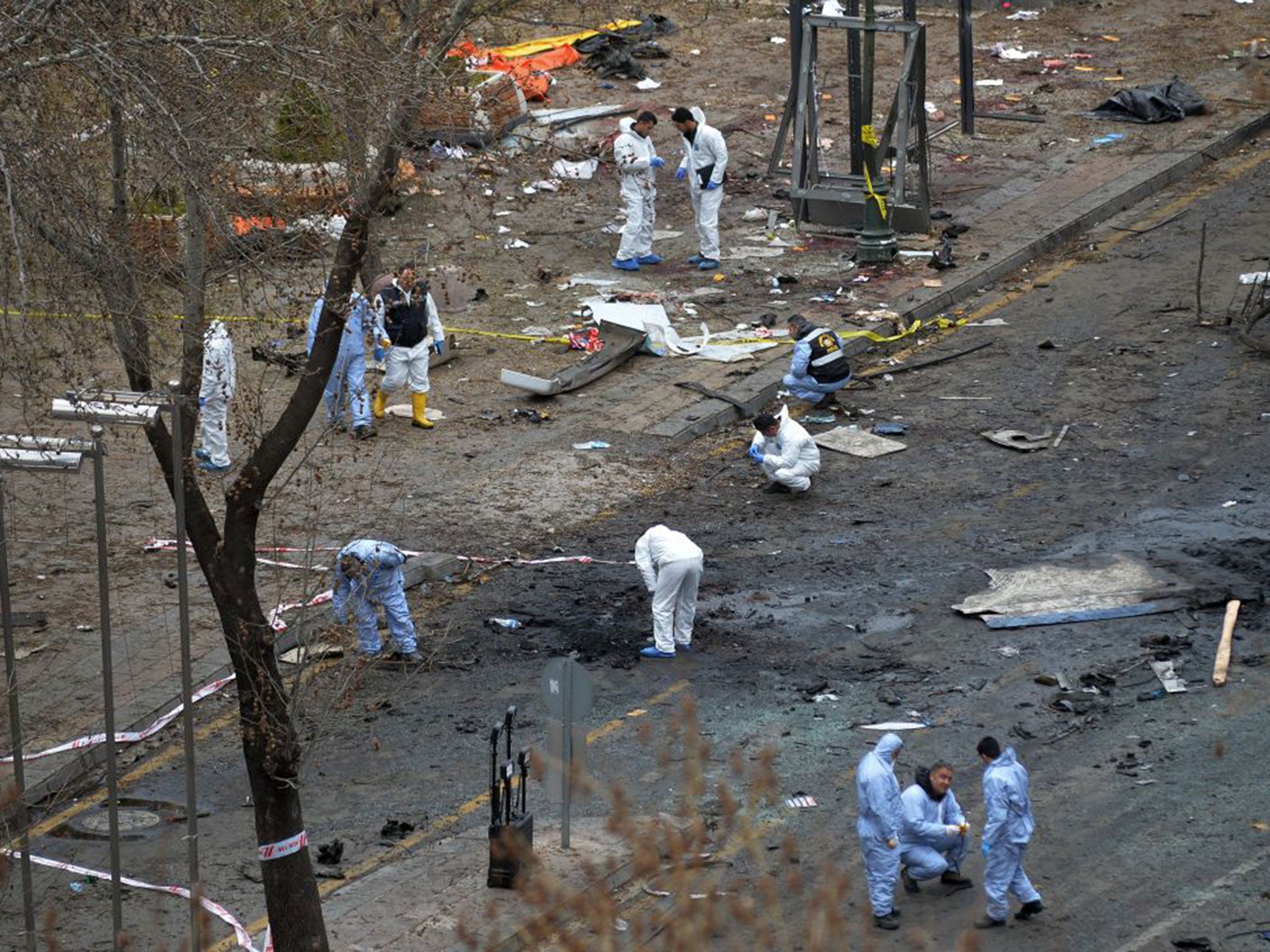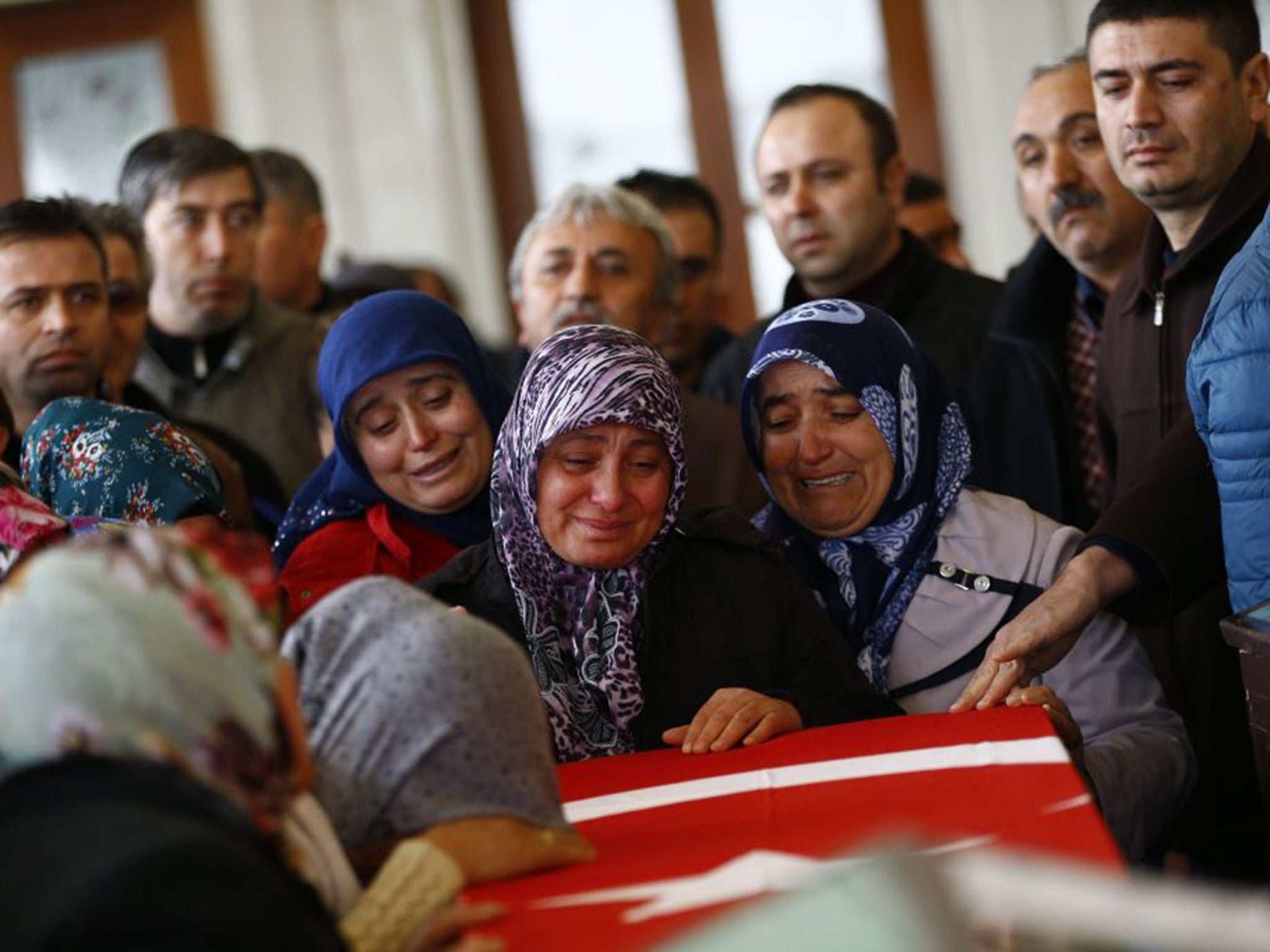Turkey car bomb marks major shift in tactics as authorities point finger of blame at PKK
The devastating car bombing in Ankara illustrates the troubling fact that a modern, tolerant society remains inherently vulnerable to suicide attacks and that each violent faction is well aware of this fact

The huge car bomb that tore through the Turkish capital was likely to have been the work of a female member of the Kurdistan Workers’ Party (PKK), authorities have said.
There was no claim of responsibility for the Ankara attack but the Turkish Prime Minister, Ahmet Davutoglu, said that there were “strong indications” that the Kurdish militant faction was responsible for the attack that claimed the lives of 37 people. The group has previously focused on attacking military targets.
The suicide bombing on Sunday night targeted a row of bus stops in a busy shopping district, killing students, young couples and families on their way home. One victim, Ozan Akkus, a 19-year-old engineering student, lost a close friend just five months previously in a double-bombing in Ankara blamed on members of the jihadist group Isis.
The latest attack underlines the multiple threats facing Turkey, a country once seen as a haven of stability that has been increasingly rocked by the war in Syria.
A Nato member home to an estimated 2.7 million Syrian refugees, Turkey is not only battling several groups engaged in the Syrian conflict, it is also fighting an internal conflict in the south-East after the collapse of a two-year peace process with the PKK. Turkey blamed the militant group for the breakdown, saying that it was emboldened by the success of Kurdish militias in neighbouring Syria. The PKK blamed Turkey for failing to deliver on promises to give greater rights to Kurdish citizens. Unlike previous flare-ups, much of the fighting this time has taken place in urban centres, causing large numbers of causalities and trapping civilians in the middle. Turkey responded to Sunday’s attack by pounding PKK targets in northern Iraq and rounding up fighters. Plans for large-scale operations against fighters in towns in the south-east were already underway yesterday, and are expected to be scaled up in response to the latest attack.

Mr Davutoglu said that the authorities had detained 11 people directly connected to the bombing and that DNA tests were underway on the remains of the suspected culprit, whom the deputy prime minister said was “definitely” female. She was reportedly born in 1992 and was from the eastern city of Kars near the Armenian border, and had joined the militant group in 2013. Tests will also take place on another body belonging to someone believed to have assisted her.
However, the Turkish government has been quick to apportion blame after other bombings, not always correctly. After an attack on a military convoy in Ankara that killed 29 people last month, the government mistakenly said that it was the work of a Syrian member of the YPG, a Kurdish militia fighting in Syria. It later said that it was the work of the Kurdistan Freedom Hawks (TAK), a splinter group of the PKK.
Analysts said that it would be highly significant if the latest attack was proven to be the work of the PKK. Howard Eissenstat, a Turkey expert at St Lawrence University in New York State, said that he believed that the attack was “much more likely” to be the work of a splinter group. He said: “Such direct involvement would mean that the PKK is no longer aiming at a negotiated settlement and that it is no longer interested in international legitimacy. This possibility strikes me as extremely unlikely. It is much more likely that a claim will come from a splinter group like TAK, which does have a history of attacking purely civilian targets. Even so, this attack suggests a worrying escalation of scale.”
Earlier, President Erdogan launched a scathing attack on the wider Kurdish movement. He said: “There is no difference between a terrorist with a gun in his hand and someone who uses his position and pen at a point that supports terror. The fact that a person is a terrorist does not change if his position is an MP, a journalist or the director of an NGO. The person who pulls the trigger may be a terrorist, but these are the people who ensure that the terrorist achieves his goals.”
Middle East Technical University (ODTÜ) first year student Ozancan Akkus (LEFT) suffered the same fate on Sunday as his close friend Ali Deniz Uzatmaz who was tragically killed in a terrorist attack in Ankara, just five months ago.
On Oct. 10, 2015, Ankara was hit by a terror attack outside the central railway station, killing Ali Deniz alongside 102 other people.
Join our commenting forum
Join thought-provoking conversations, follow other Independent readers and see their replies
Comments
Bookmark popover
Removed from bookmarks